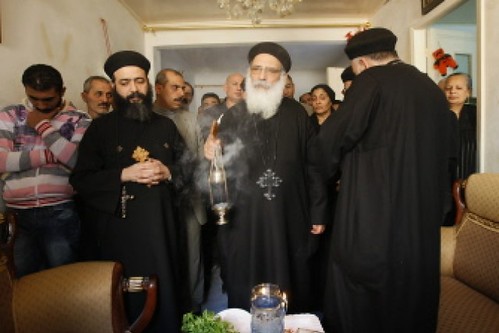
Egyptian Coptics were victims of an attack in Alexandria on December 31, 2010. A number of people died after a bomb blast went off outside an historic church. a photo by Pan-African News Wire File Photos on Flickr.
latimes.com
13 killed in clashes between Copts and Muslims in Egypt
The bloodshed — on the edge of a Cairo slum — renews worry about the government's willingness to protect minority Christians. The army intervened only after Muslims set fire to homes and businesses.
By Garrett Therolf and Doha Al Zohairy, Los Angeles Times
6:09 PM PST, March 9, 2011
Reporting from Cairo
Egypt suffered the deadliest unrest since President Hosni Mubarak's ouster when clashes Wednesday between Muslims and Coptic Christians left 13 dead and 140 injured.
The bloodshed, on the edge of a Cairo slum, renewed concern about the government's willingness to protect the Christian minority. Army units intervened only after Muslims set fire to homes and businesses.
"The people attacked us and the army was helping them. The army was among those who shot at us," said Massoud Younan Abde Mach, a 47-year-old Christian who works as a garbage collector.
An army officer, who declined to provide his name, denied that the military fired shots and said, "Both sides attacked and the army was caught in the middle."
"We had to wait for reinforcements before going in," he said. "Without us, the losses would have been greater."
Authorities said the dead were evenly divided between Christians and Muslims, and witnesses said the victims included a 14-year-old boy who was shot in the head.
At its first meeting Wednesday, the new government of Prime Minister-designate Essam Sharaf denounced the violence and said it would strictly enforce laws forbidding attacks on places of worship. It also pledged to redeploy police forces that have not returned to the streets at full levels since Mubarak was toppled from power last month.
Egypt's Coptic Christians, about 12% of the population, have long been subject to discrimination. No church can be built or repaired without a presidential decree. Copts have also been targeted in a recent series of attacks, including the New Year's Day bombing of a church in Alexandria that killed 25 worshipers. The Mubarak government blamed that attack on an Al Qaeda-linked Palestinian militant group.
The latest unrest began Tuesday when a group of men from the largely Christian slum known as Garbage City blocked a nearby highway to protest the burning of a church last week in a rural Egyptian village. A crowd of Muslims then gathered around them, and a shouting match consisting of unfounded rumors ensued: The Muslims are planning to say Friday prayers at the site of the burned church! The Christians are kidnapping veiled women in the slum over there!
By evening, Eid Anwar had locked the plastic recycling plant he owns and walked across the street to his home. His wife was preparing breaded chicken and baked macaroni in the oven. His 10-year-old son played video games.
They heard a horde of people rushing up the hill and working their way through the Anwars' iron gate. Other homes were also under attack, but the army stood on the sidelines, he said, and the few Muslim homes were skipped.
The mob eventually made its way inside, setting fire to the Anwars' belongings and raiding their valuables.
Anwar said his son hid in a trash bin until the family escaped from the roof to a neighboring building.
The army finally intervened hours later, Anwar said, but the violence didn't end until early Wednesday. When he later inspected the remains of his home and factory, he said, "I want to leave this country."
The slum is home to more than 60,000 zabaleen, or "garbage people," who have turned refuse into a way of life. Their homes are built amid countless small dumps where the garbage that residents collect at night is sorted by hand and recycled for income.
Since the onset of the revolution, some in the slum have celebrated because it has meant the retreat of the national police, giving residents the opportunity to reenter neighborhoods previously blocked by checkpoints where officers demanded licenses and bribes.
But the revolution is generally less popular in Garbage City than in other parts of Cairo because many predict that the Muslim Brotherhood will seize control of the country, which Copts fear will lead to increased deprivation and harassment.
Ezzat Guindy, executive director of a nonprofit organization in the slum, said he believes security forces in the past stoked Muslim-Christian tension to cite as an example of the necessity for Mubarak's brutal regime.
But the fear has only accelerated since Mubarak's fall.
"The Muslim Brotherhood will take over and they would like to expel us from the country if they could. I am afraid," said a 37-year-old woman who gave only her first name, Awaetif.
She was part of a clutch of women sorting moldy pita bread and chicken bones from plastic bags, toothpaste tubes and used tampon applicators.
Squatting in the piles of garbage, the women sported nail polish and gold-colored earrings, signs, they said, that they were winning out over poverty.
garrett.therolf@latimes.com
Zohairy is a special correspondent.
No comments:
Post a Comment